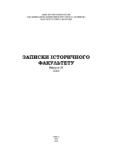ДЕЯКІ АСПЕКТИ АДАПТАЦІЇ ДЕПОРТОВАНИХ БОЙКІВ У СТЕПАХ РОЗДІЛЬНЯНЩИНИ
SOME ASPECTS OF ADAPTATION OF DEPORTED BOYKOS IN THE STEPPE DISTRICT OF ROZDILNA
Author(s): Nataliia Petrova, Tetiana SydorenkoSubject(s): Cultural history, Ethnohistory, Social history, Post-War period (1950 - 1989), Migration Studies
Published by: Видавництво «Одеський національний університет І. І. Мечникова»
Keywords: Boykos; migrants; deportation; Ukrainians; Odesa region;
Summary/Abstract: In the article, based on the analysis of the memories of the deportees, an attempt is made to scrutinize some aspects of their adaptation in the Rozdilna district of Odesa Region. The information obtained gives grounds to determine that the deportees became hostages of the Polish-Soviet border adjustment treaty of 1951, known in Poland under the pseudonym "Akcja H-T 1951". This was not the first wave of immigrants in the Odesa Region, so because of the resettlement of the western Ukrainian population in 1944-1946 from Nadsyannia, Kholm, Podlasie and Lemko, thousands were forced to leave their homes, farms, change or even lose their usual way of life. The resettlement of the western Ukrainian population affected the ethnic composition of a number of regions of the Ukrainian SSR and Odesa Region in particular. The study analyzes the literature and testimonies, which provide an opportunity to detail the process of organizing the resettlement and relocation of migrants in new territories. The analyzed sources of information give grounds to claim that the process of resettlement in some places was spontaneous and disorderly, as evidenced by the problems faced by deportees in the new territories. Among the main problems were the unwillingness of the authorities to provide housing for migrants, the need to work hard in the collective farm in low-paid jobs, new climate conditions that have encouraged them to adapt and master other types of farming. There were some cases of interethnic hostility, ideological confrontation. The materials testify to the unwillingness of the state in the conditions of hostilities and in the first post-war period to provide the displaced with even vital essentials. It was very difficult for the Boykos to retain their ethnic peculiarity in the conditions of the Ukrainian South. First, the Boykos lost their small homeland and gradually realized the impossibility of returning to it; secondly, they found themselves in unusual geographical and climate conditions - the steppe zone has different trends of economic activity. As a result, the Boykos specific labor skills were lost. In addition, working in the collective farm from morning until night, parents were not able to pass on the torch to their children; third, the Boykos had to live among people with different historical experiences and different mentalities. Here the negative image of the Ukrainian of the western territories was cultivated - "unreliable person", "anti-Soviet element", "Bandera"; fourth, historical destiny and culture of the Boykos were deliberately ignored. The peculiarity of the deportation action was that all residents of the area, regardless of ethnicity, were subject to eviction; the evicted had no right to freely choose their place of future residence.
Journal: Записки історичного факультету
- Issue Year: 2020
- Issue No: 31
- Page Range: 40-61
- Page Count: 22
- Language: Ukrainian

